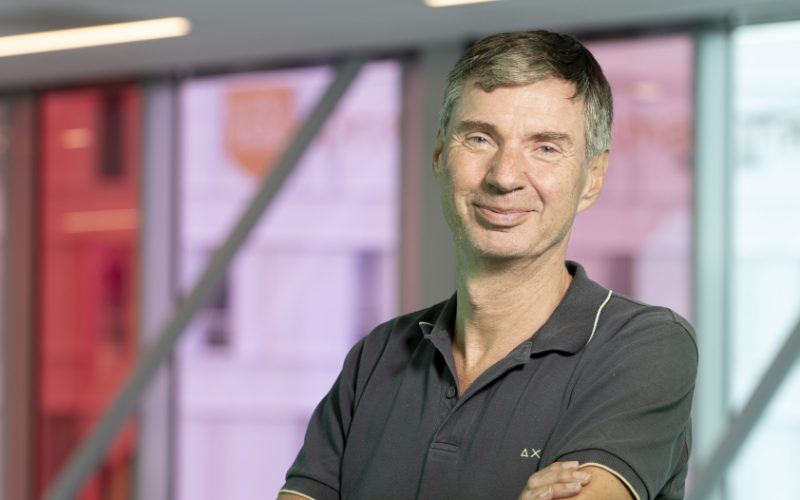Ronald de Krijger, Professor of Pathology of Solid Childhood Tumours delivered his inaugural address at the Academy Building of Utrecht University on 4 July. His message: ‘In connection, developments within pathology allow us to further improve care for children with cancer.’
Since 15 June 2023, Ronald has been appointed Professor of Pathology of Solid Childhood Tumours at the Faculty of Medicine of Utrecht University. From the very beginning, Ronald has been applying his knowledge and experience within pathology at the Princess Máxima Centre. Previously, he held the chair in paediatric pathology at Erasmus MC in Rotterdam. Ronald: “The Princess Máxima Centre is an amalgamation of the previously 7 different paediatric oncology centres in different university medical centres. That is unique for the Netherlands, for Europe. As a result, my colleague and I see, for example, all kidney tumours in children in the Netherlands, 35 per year, instead of only 5-10 per centre when we were all separate. And as a member of the international pathology panel, I see as many as 1,000 childhood kidney tumours a year. That adds to the quality of our work.”
The role of a pathologist within a hospital is not obvious to everyone, but Ronald clarifies as follows: “Actually, we are a small useful boat that keeps other bigger boats (internists, surgeons, other specialists, and at Maxima especially the paediatric oncologists) on course or points the right course. We make a diagnosis based on tissue from the patient that we examine. That diagnosis often forms the basis for further treatment and usually already says something about the patient’s prognosis.
What was the key message? “During my oration, I shared my vision of accelerating the translation of pathological developments into the clinic. How we already do this within Máxima in the form of two-way communication, but also how we can improve this further. I also elaborated on the various technological developments in my field and what this will mean for children with cancer. How AI (artificial intelligence) can start to help us in the analysis of microscopy images and what the future cyclic immuno-fluorescence equipment will bring us.”
For collaboration, both in patient care and research, Ronald and his team mainly rely on other top international institutes, such as DKFZ in Heidelberg, GOSH in London and Gustave Roussy or Marie Curie in Paris, in addition to North American centres, such as St Jude in Memphis, Sick Kids in Toronto and several more.
In addition, he feels he has a duty to encourage improvements in paediatric oncology care in Europe and beyond. Thus, in the Outreach programme, led by Prof Gertjan Kaspers and with help from many, he works with Malawi, Kenya, Tanzania, and Indonesia. Within Europe, meanwhile, also with Kosovo, Athens, Bratislava and Bucharest, where there are promising initiatives to invest in paediatric oncology. Ronald: “This international cooperation is also useful for our own centre.”
His current chair in Utrecht is focused on pathology of solid childhood tumours and this 2023 appointment will help to obtain funding and thus start new projects. Ronald on the oration: “I really enjoyed being able to share my knowledge of pathology more widely again. And I hope to inspire the next generation of doctors and scientists. Within the training of PhD students, but also in the lecture hall.”
